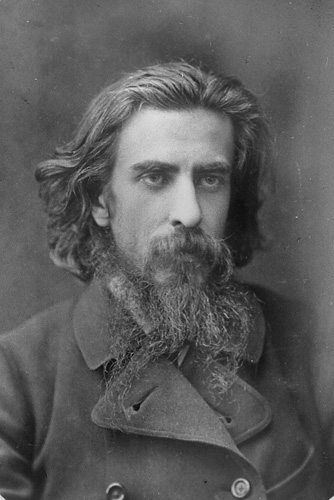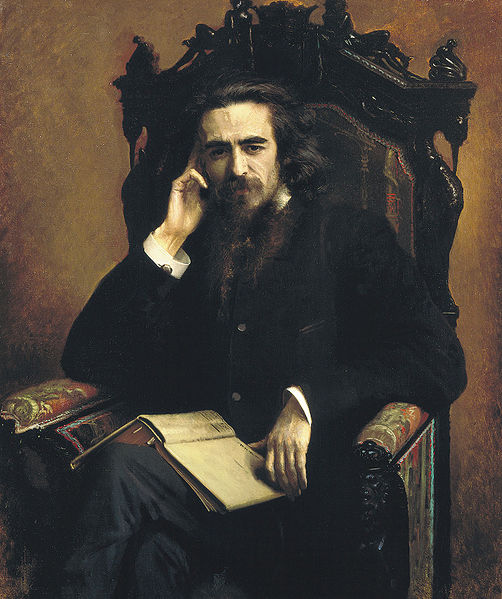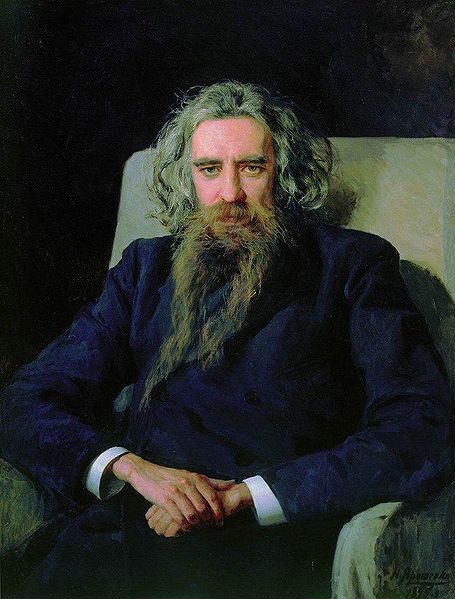<Back to Index>
- Philosopher Vladimir Sergeyevich Solovyov, 1853
- Writer Marta Bibescu (Marthe Lucie Lahovary), 1886
- Indian Freedom Fighter Lala Lajpat Rai, 1865
PAGE SPONSOR



Vladimir Sergeyevich Solovyov (Russian: Влади́мир Серге́евич Соловьёв; January 28 [O.S. January 16] 1853 – August 13 [O.S. July 31] 1900) was a Russian philosopher, poet, pamphleteer, literary critic, who played a significant role in the development of Russian philosophy and poetry at the end of the 19th century. Solovyov (the last name derives from "соловей", "solovey", Nightingale in Russian) played a significant role in the Russian spiritual renaissance in the beginning of the 20th century.
Vladimir Solovyov was born in Moscow on 16 January 1853, in the family of well known Russian historian Sergey Mikhaylovich Solovyov (1820 – 1879). His mother, Polixena Vladimirovna, belonged to a Ukrainian - Polish family, having among her ancestors a remarkable thinker the 18th century Hryhori Skovoroda (1722 – 1794).
In his teens Solovyov renounced Orthodox Christianity for nihilism though later Solovyov changed his earlier convictions and began expressing views in line again with the Russian Orthodox Church. What prompted this radical change appears to be Solovyov's disapproval of the Positivist movement. In Solovyov's The Crisis of Western Philosophy: Against the Positivists he attempted to discredit the Positivists' rejection of Aristotle's essentialism or philosophical realism. In Against the Postivists, Solovyov took the position of intuitive noetic comprehension, noesis or insight stating consciousness, in being is integral (Russian term being sobornost) and has to have both phenomenon (validated by dianonia) and noumenon validated intuitively. Positivism according to Solovyov only validates the phenomenon of an object denying the intuitive reality people experience as part of their consciousness. Vladimir Solovyov was also known to be a very close friend and confidant of Fyodor Dostoevsky. In opposition to Dostoevsky's apparent views of the Roman Catholic church, Solovyov has been rumored to have converted to Roman Catholicism four years before his death. It could be said that he did this to engage in the reconciliation (ecumenism, sobornost) between Roman Catholicism and Eastern Orthodoxy, a reconciliation that Solovyov outspokenly favored, but Solovyov himself always maintained that he was still a Russian Orthodox believer and that he had never left the Orthodox faith. Solovyov believed that his mission in life was to move people toward reconciliation or absolute unity or sobornost.
Solovyov never married or had children, though he pursued idealized romantic relationships as immortalized in his spiritual love poetry, including with two women named, appropriately enough, Sophia. Shortly afer rebuffing the scandalous advances of mystic Anna Schmidt who claimed to be his divine partner, Solovyov died an apparent homeless pauper, leaving his brother Mikhail Sergeevich and several colleagues to defend and promote his legacy.
It is widely held that Solovyov was Dostoevsky's inspiration for the characters Alyosha Karamazov and Ivan Karamazov from The Brothers Karamazov. Solovyov's influence can also be seen in the writings of the Symbolist and Neo - Idealist of the later Russian Soviet era. His book The Meaning of Love can be seen as one of the philosophical sources of Leo Tolstoy's The Kreutzer Sonata (1889).
He influenced the religious philosophy of Nicolas Berdyaev, Sergey Bulgakov, Pavel Florensky, Nikolai Lossky, Semen L. Frank, the ideas of Rudolf Steiner and also on the poetry and theory of Russian symbolism, viz. Andrei Belyi, Alexander Blok Solovyov's nephew, and others. Hans Urs von Balthasar explores his work as one example of seven lay styles that reveal the glory of God's revelation, in volume III of The Glory of the Lord (pp. 279 – 352).
Solovyov compiled a philosophy based partly on Hellenistic pagan philosophy (see Plato, Aristotle and Plotinus) and also early church Patristic tradition along with Buddhism and Hebrew Kabbalistic elements (i.e. Philo of Alexandria). Solovyov also studied Gnosticism and seemed to be heavily influenced by the gnostic works of Valentinus. Solovyov's religious philosophy was syncretic and fused many of the philosophical elements of various religious traditions with that of the Eastern Orthodox church and also Solovyov's own personal experience of the Sophia. Solovyov described his encounters with the entity Sophia in his works the Three Encounters and Lectures on Godmanhood among others. Solovyov's fusion was driven by the desire to reconcile and or unite with Eastern Orthodoxy these various traditions via the Russian Slavophiles' concept of sobornost. His Russian religious philosophy had a very strong impact on the Russian Symbolist art movements of his time. Solovyev's teaching on Sophia have been deemed a heresy by ROCOR and condemned as unsound and unorthodox by the Patriarchate of Moscow.
Solovyov sought through his works to create a form of philosophy, that could through his system of logic or reason, reconcile
all various bodies of knowledge or disciplines of thought. It was Solovyov's goal
to fuse all conflicting concepts into a single systematic form of
reason. It was this complete form of
philosophy that Solovyov presented as being Russian philosophy. That based on the central components of the slavophile movement,
all forms of reason could be reconciled into one single form of logic.
The heart of this reconciliation as logic or reason was the concept
sobornost (organic or Spontaneous order through
integration) which is also the Russian word for catholic. Solovyov
sought to find and validate the common ground and or where various
conflicts found common ground and by focusing on this common ground to
establish absolute unity and or integral fusion of opposing ideas and of peoples.
"As long as the dark foundation of our nature, grim in its all - encompassing egoism, mad in its drive to make that egoism into reality, to devour everything and to define everything by itself, as long as that foundation is visible, as long as this truly original sin exists within us, we have no business here and there is no logical answer to our existence. Imagine a group of people who are all blind, deaf and slightly demented and suddenly someone in the crowd asks, "What are we to do?"... The only possible answer is, "Look for a cure". Until you are cured, there is nothing you can do. And since you don't believe you are sick, there can be no cure."